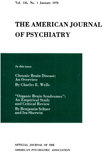THE MENTAL HEALTH OF THE UNMARRIED
Abstract
Data from the 785 interviews of married and never married respondents in a sample of the adult population of San Francisco are presented by marital status. On most of our indices of adjustment it was found that more single men are maladjusted than single women, and more single men are maladjusted than married men, thus confirming and enlarging on the results of other studies. These findings were discussed in terms of two general types of explanatory factors: selective factors and reactive factors. Because of the greater freedom of choice men have in the marriage market, it seems likely that those among them who are either unable or unwilling to get married were more psychologically impaired to begin with. Evidence from our data for this argument is the higher proportion of childhood stress among single men than among any other group. Explanations in terms of reactive factors suggest that without marriage men, more than women, have a tendency to become socially isolated and antisocial. While our data show that single men are in fact more socially isolated and more antisocial than single women (and than married men) it is not possible to say whether this is due to reaction or to selection.
Of interest is the fact that in some ways single men are more "masculine" than married men (in their lack of moral strictness, and in the value they place on being free to do as they choose) while in other ways they are less "masculine" (in their greater passivity). Similarly, single women are in some ways more "feminine" than married women (in their moral strictness) and in other ways are less "feminine" (in their lesser degree of phobic reactions and in their greater dominance).
Access content
To read the fulltext, please use one of the options below to sign in or purchase access.- Personal login
- Institutional Login
- Sign in via OpenAthens
- Register for access
-
Please login/register if you wish to pair your device and check access availability.
Not a subscriber?
PsychiatryOnline subscription options offer access to the DSM-5 library, books, journals, CME, and patient resources. This all-in-one virtual library provides psychiatrists and mental health professionals with key resources for diagnosis, treatment, research, and professional development.
Need more help? PsychiatryOnline Customer Service may be reached by emailing [email protected] or by calling 800-368-5777 (in the U.S.) or 703-907-7322 (outside the U.S.).



